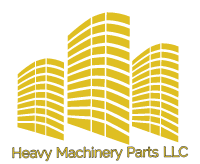Fluid filtration is at the heart of heavy machinery maintenance, directly impacting machine performance and durability. Proper filtration systems ensure that contaminants are kept out of vital components, preserving the integrity of everything from the engine to hydraulic systems. Effective filtration not only prevents equipment downtime but also prolongs the machinery’s lifespan and minimizes repair costs.
It’s clear that fluid-related issues are among the most severe in heavy machinery. Even a minor leak can lead to component overload, affecting the entire system’s functionality. This makes filtration a core element in maintaining heavy machinery’s efficiency and preventing serious operational setbacks.
Don’t forget, we also offer a wide range of spare parts for heavy machinery, so feel free to inquire about any replacement needs you may have. Just click on contact us.
Components and Systems Affected by Inadequate Filtration
Heavy machinery relies on various systems where fluid integrity is crucial, such as engines, hydraulics, and lifting mechanisms. Fluids play essential roles across multiple components, including lubricants for reducing friction, coolants for temperature control, and hydraulic fluids for powering attachments and movements.
When filtration is insufficient, contaminants enter these systems and cause premature wear and tear. Over time, dirt, dust, and metal particles build up in the machinery, clogging components and leading to reduced performance. The heavy machinery’s reliance on multiple fluid-based systems underscores the critical importance of an efficient filtration strategy across each one.
Common Causes of Fluid Leaks in Heavy Machinery
Fluid leaks in heavy machinery can be traced to several sources:
- Wear and Tear of Seals and Gaskets: Over time, seals, gaskets, and hoses degrade, especially in machinery exposed to extreme temperatures and stress.
- Human Handling: Improper handling or assembly can damage connection points, causing leaks. It’s essential for operators to be trained in safe handling techniques to prevent accidental harm to fluid connections.
- Environmental Stressors: Heavy equipment often operates in harsh environments, where high temperatures and rough conditions can wear down seals and hoses. These extreme conditions increase the risk of leaks and make it essential to select high-quality, durable materials.
The gasket and seal deterioration highlights the necessity of both preventive maintenance and quality part selection to mitigate wear.
Consequences of Fluid Leaks: Impact on Performance and Safety
Fluid leaks may seem minor initially but can lead to extensive damage if ignored. When fluids leak, they can cause:
- Component Overload: Without adequate lubrication or coolant, machinery parts undergo more friction and stress, leading to accelerated wear.
- Increased Repair Costs: Leaks can cascade into larger mechanical failures, raising repair expenses and downtime.
- Safety Hazards: Certain leaks pose safety risks, such as slips or fires, if flammable fluids are involved.
These issues demand prompt detection and action to protect both machinery and personnel. Constant vigilance of control panel alerts and regular inspections are vital practices for avoiding costly repercussions.
Remember that by subscribing you will get free templates for heavy machinery maintenance.
Best Practices for Fluid and Filter Maintenance
To keep machinery running smoothly, adhering to a robust maintenance schedule is essential. Here are some of the best practices:
- Scheduled Filter Changes: Regularly replacing filters prevents clogs and ensures a clean fluid flow. Schedule changes based on operational hours and manufacturer recommendations.
- Inspection and Replacement of Seals: Routinely inspect seals and gaskets, as worn components can allow contaminants into sensitive systems.
- Fluid Analysis and Replacement: Analyze fluids regularly to detect early signs of contamination or degradation. Replacing fluids based on test results helps maintain performance.
The advice to watch for drips and promptly replace fluids resonates here, highlighting how small, proactive measures can prevent larger failures.
Current Technologies for Leak Detection and Monitoring
Advancements in technology have greatly improved leak detection and monitoring capabilities for heavy machinery. New tools and sensors can now detect even the smallest leaks, providing real-time data to operators.
- Fluid Sensors: These sensors monitor fluid levels and detect drops that may indicate leaks, alerting operators instantly.
- Predictive Maintenance Software: Using data analytics and machine learning, these systems predict maintenance needs before leaks occur, based on patterns of wear and usage.
- Smart Control Panels: Modern control panels with built-in monitoring for temperature, pressure, and fluid levels offer another layer of protection, ensuring timely maintenance.
Staying attentive to dashboard alerts is crucial. Technology like this enables operators to catch issues early and avoid costly downtime.
Practical Tips to Prevent Leaks and Extend Equipment Life
Preventive care is key to maintaining heavy machinery. Here are a few practical steps:
- Regular Inspection: Conduct visual inspections for drips, leaks, and wear on gaskets and hoses.
- Follow Recommended Service Intervals: Sticking to the manufacturer’s recommended intervals for fluid and filter changes minimizes the chance of contaminants building up.
- Use Quality Parts and Fluids: High-quality seals, gaskets, and filters may cost more upfront but provide superior durability and protection against leaks.
- Educate Operators: Training on correct handling techniques reduces the risk of accidental damage during operations and maintenance tasks.
The importance of being vigilant and proactive in maintenance routines. Simple, routine checks and quality materials go a long way in preventing fluid leaks and extending machinery lifespan.
